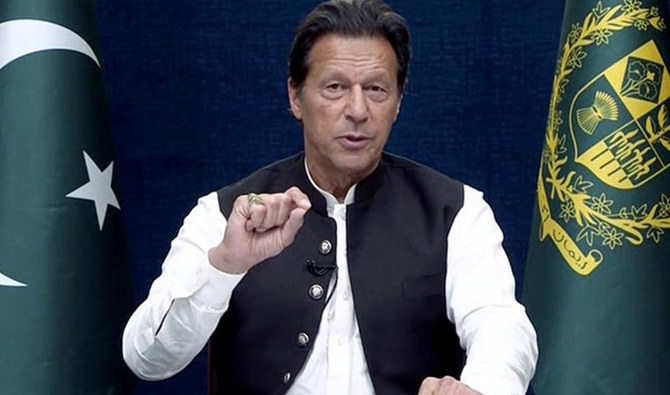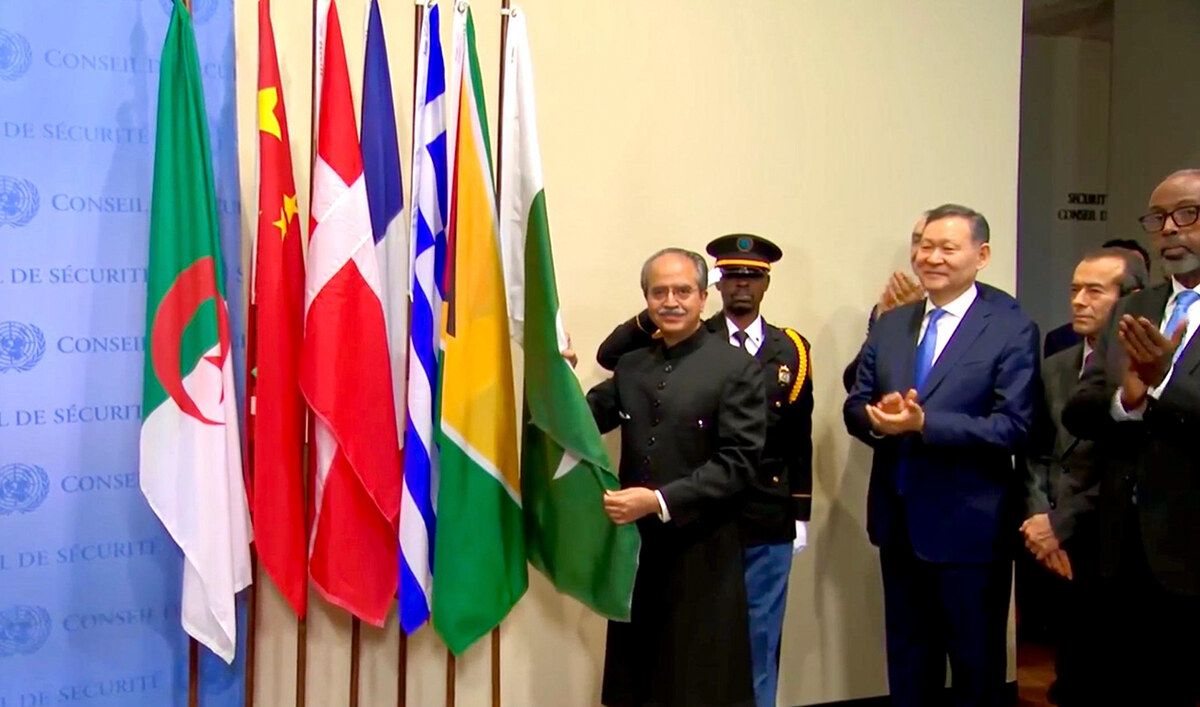ISLAMABAD: Pakistan's top court said on Sunday the prime minister's advice and the president's decision to dissolve the National Assembly would be subject to its final verdict while adjourning its proceedings to look into the recent political developments in the country until Monday.
Earlier, Prime Minister Imran Khan “congratulated” the nation after the deputy speaker of the assembly disallowed voting on a no-confidence motion against the premier on grounds it was "unconstitutional," with the president subsequently dissolving the national assembly.
A three-member Supreme Court bench refused to suspend the deputy speaker's order to provide interim relief to the opposition, though it issued notices to all relevant officials, including the defense and interior secretaries, to conduct further hearings.
The prime minister has said the campaign to oust him through a no-trust vote was part of a foreign conspiracy orchestrated by the United States.
As Sunday’s session began, Information Minister Chaudhry Fawad Hussain said in light of the alleged foreign interference in domestic politics, the no-trust motion was against Article 5, which deals with obedience and loyalty to the state and constitution.
Deputy speaker Qasim Suri accepted Hussain's points as "valid," and threw out the motion on the grounds it was "unconstitutional."
“We will not let such a [foreign] conspiracy succeed,” Khan said in an address to the nation after the parliament session. “I have just now sent my advice to the president of Pakistan to dissolve the assemblies.”
Khan then called on the public to prepare for elections: “No foreign government or corrupt people will decide [the fate of the nation].”
The president subsequently dissolved the national assembly.
The Supreme Court took notice of these developments, as opposition parties called the speaker's ruling illegal and decided to challenge it.
However, the prime minister told his party parliamentarians that Pakistan’s National Security Council had seen a communique by the country’s ambassador in Washington after his “official meeting” with a senior American official Donald Lu that proved the no-confidence motion was the result of external interference in Pakistan’s politics.
He added that all the security chiefs were also present at the gathering.
“When the highest security body of the country confirms it, then the numbers [in the national assembly] become irrelevant,” he said.
Deputy speaker Suri also mentioned the same document in his detailed ruling to justify his decision to disallow the no-trust voting against the prime minister.
"Suffice it to say that to me it is now clear that there has been blatant foreign interference in the internal affairs of Pakistan and there exists a close nexus between such foreign interference and the campaign to oust and remove the democratically elected government headed by Prime Minister Imran Khan through different means including the motion for no-confidence," he wrote.
He added "no self respecting independent, democratic country and people with national pride and dignity" should ever allow such external interference in national politics while demanding a probe into the issue.
"This would require a thorough investigation by appropriate forum or authority under the law," he added. "However, without such thorough probe, if such motion no-confidence is entertained in the garb of parliamentary process now or allowed to succeed and foreign country is able to achieve its goal to oust a democratically elected Government and/or Prime Minister in this manner, we shall cease to be an independent and sovereign country governed by the Constitution and the law."
However, the opposition questioned the legality of the ruling, saying the government had committed a serious act of treason by violating the constitution.
“Today, a man obsessed with power trampled on the constitution,” the country's former prime minister Nawaz Sharif wrote in a Twitter post. “Imran Khan, who puts his ego before the country and the nation, and all the conspiratorial characters involved in this scheme are guilty of serious treason to which Article 6 applies. Abuse of Pakistan and desecration of the constitution will not go unpunished.”
"Pakistan's constitution has been subverted," opposition leader Bilawal Bhutto-Zardari said after the National Assembly session. "We will do a sit-in at the National Assembly until the vote is allowed to take place."
"The Supreme Court has to decide that the vote must take place today."
The joint opposition filed the no-trust motion against PM Khan earlier this month, accusing him of economic meltdown, foreign policy failures and poor governance.
Under the Pakistani constitution, a prime minister is elected by a majority of the lower house, the National Assembly. A candidate needs a simple majority of legislators, 172, to vote for him to become prime minister. That is the same number of votes against him in a no-confidence vote needed to oust him and dissolve his cabinet.
The opposition collectively had 162 members, while the government had the support of 179 lawmakers, including its coalition partners.
In recent weeks, however, defections by over a dozen of his party's lawmakers and the exit of coalition partners, including the Muttahida Qaumi Movement-Pakistan (MQM-P), Balochistan Awami Party (BAP) and the Jamhoori Watan Party (JWP), have left Khan short of a simple majority.


















